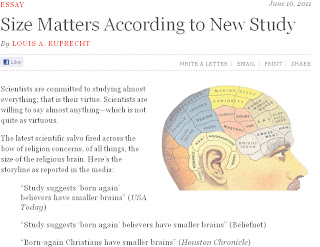This week’s Religion Dispatches has a rather disappointing rant from Louis A. Ruprecht, discussing a recent Duke University study showing that the brains of ‘born-again’ Christians tend to atrophy (shrink) faster than others later in life.
Here is how Prof. Ruprecht begins his article:
Scientists are committed to studying almost everything; that is their virtue. Scientists are willing to say almost anything—which is not quite as virtuous.
The latest scientific salvo fired across the bow of religion concerns, of all things, the size of the religious brain. Here’s the storyline as reported in the media:
“Study suggests ‘born again’ believers have smaller brains” (USA Today)
“Study suggests ‘born again’ believers have smaller brains” (Beliefnet)
“Born-again Christians have smaller brains” (Houston Chronicle)
In fact, that’s a somewhat selective list of stories on the findings of a highly selective study.
Note first of all that scientists aren’t the ones “saying anything” in a non-virtuous fashion. It’s actually the media who have zeroed in on the matter so offensive to Prof. Ruprecht. Now, if this had been a story about media misrepresentation of science, it would be interesting, but instead Ruprecht misplaces his blame and frustration, meandering into a long, illogical anti-science diatribe.
Bracketing the question of who devises studies like this and who funds them, the conclusion the reader is supposed to draw from the headlines is obvious: the evangelically and “born again” religious are pinheads. Small brain means little intelligence. Which is about as pinheaded a conclusion as one can imagine.
Read the study. There is absolutely no mention of intelligence. Repeat: no mention of intelligence. It is therefore odd that Ruprecht suggests that these claims (again, NOT made in the article), “echo claims made by the now-suspect 19th century science of Phrenology.”
Hmm… “Now-suspect?” Phrenology isn’t “now-suspect.” It’s actually more in the realm of batshit pseudoscience (link) (link) (wiki). Anyhow, that’s just one of the many statements that puts Prof. Ruprecht’s so-called article in the realm of ranting diatribe. Surely it couldn’t get worse, right? Wrong!
Naturally, the Nazi pseudo-science of racializing the human head and face dealt a deserved death-blow to such nonsense [phrenology, that is].
But in studies like this one, Phrenology’s back again in a new form, implying this time that the size of the brain is any indicator of human intelligence.
What?
So this study not only calls born again Christians pinheads, but it relaunches Phrenology, which led to Nazism in Germany and the second world war and… oh my god… Stop!
Did I mention that there is no mention of intelligence in the study itself? Even the article on beliefnet doesn’t say anything about intelligence. This “implied” finding is just made up by Ruprecht himself (perhaps others too, but it clearly isn’t in the study).
He goes on to note that other studies have found brain growth in long-time Buddhist meditators. And thus, “If you’ve got a small brain then you’re more likely to be born again, and if you have a more active brain then you’re more likely to be a Buddhist.”
Of course this is CLEARLY a case of the logical fallacy affirming the consequent. What the science actually suggests, in both cases, is that:
- if you are born again, you are more likely to face greater atrophy later in life (thus to have a smaller brain)
- if you meditate enough you will likely stimulate and develop greater brain size
And let’s be very clear: the unstated motivation for much of this new science is the desire to unseat a certain sort of religion by making it seem stupid. Becoming a Buddhist will make you smarter, but submitting to the regime of born-again Christianity will make you dumber. It’s intended as an insult, obviously. But less obvious is the logic behind the insult.
Isn’t it just the latest version of the perennial masculinist insult that size matters—that if you’re small, you’re less of a man?
Needle-dick. Pin-head… They’re flipsides of the same insult. What’s astonishing is that grown scientists would engage in that sort of thing.












